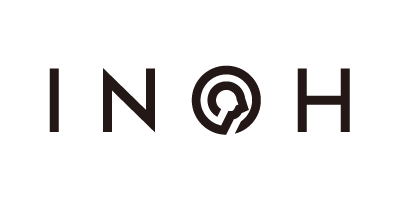From August 18 to 22, 2025, I participated in the BMoE Boot Camp hosted at the Sutardja Center for Entrepreneurship & Technology (SCET), UC Berkeley in California.
“BMoE” stands for the Berkeley Method of Entrepreneurship, a 4.5-day program designed to comprehensively build the skills needed to launch a startup. Participants spend the week forming teams, refining ideas, and ultimately completing an investor-ready presentation by the final day.
The camp welcomed over 100 participants, not only from Berkeley but also from universities in the UK, China, Moldova, South Korea, Taiwan, and more. Among them, I was the only individual participant from Japan.
For me, someone who dreams of launching services that contribute to society, this was a rare chance to learn entrepreneurship in the U.S.—a global leader in innovation. The Bay Area has always been a place I admired, as the headquarters of countless world-famous tech companies and a hub of thriving startups. I discovered this program thanks to ChatGPT, contacted instructor Gigi Wang directly, and was fortunate to be accepted.
Here are my main takeaways and reflections from the Boot Camp.

1. Lectures
The lectures covered a wide range of topics on how to launch a startup. The phrases that stuck with me the most were:
“Iterate, iterate, iterate!”
“Optimize, optimize, optimize!”
“Network, network, network!”
- Iterate & Optimize: Repeatedly test and refine ideas until you secure enough paying users (traction) to prove the business is viable.
- Network: Constantly reach out to customers, mentors, and partners to discover opportunities.
When traction and scalability become clear, that’s the time to consider funding—and by then, you should already be able to answer investors’ questions like “Why now?” and “Why you?”. (This struck me especially because in the past I raised funds too early, without sufficient validation, and ended up in debt.)
Other highlights included:
a. Mindset
- Entrepreneurs are not just inventors—they commercialize innovation and build businesses.
- Always act with a growth mindset.
- Be aware of cultural habits that act as barriers to growth and learn to overcome them.
- Instead of spending too much time thinking, launch into the market early and recognize the flaws of your own ideas.
b. Communication
- Use a strong “hook” to grab attention; if it doesn’t stick, it’s as if you never said it.
- Keep pitches concise and structured (using NABC: Needs, Approach, Benefits, Competition) to capture interest and secure follow-up meetings.
c. Go-to-Market Strategy
- Define your beachhead market through segmentation.
- Quantify everything from both top-down and bottom-up perspectives.
- Although definitions of marketing vary, the common ground is that it is “purposeful communication with all stakeholders.”
d. Partnerships & Data
- Strong partnerships are a foundation for success.
- Startups fail not from lack of technology, but from lack of customers.
- Companies that control data win. Apple, Google, and Amazon leverage data to expand into fintech, healthcare, and smart homes. Traditional financial institutions, meanwhile, are losing ground to data-driven fintech startups.
e. Live Demo of Vibe Marketing
Using AI tools, we saw how to build promotional videos, landing pages, and automated workflows for site visitors in about 30 minutes.
f. Fundraising
- VC business models: LPs expect 3x returns.
- Each successful investment must cover the losses of many failed startups.
- Funding tends to concentrate in later-stage companies, making the environment tough for early-stage founders.
- To attract investment, you must show a business model that can dominate a large market, along with traction and a capable team.
- Each successful investment must cover the losses of many failed startups.
g. Stories from Alumni
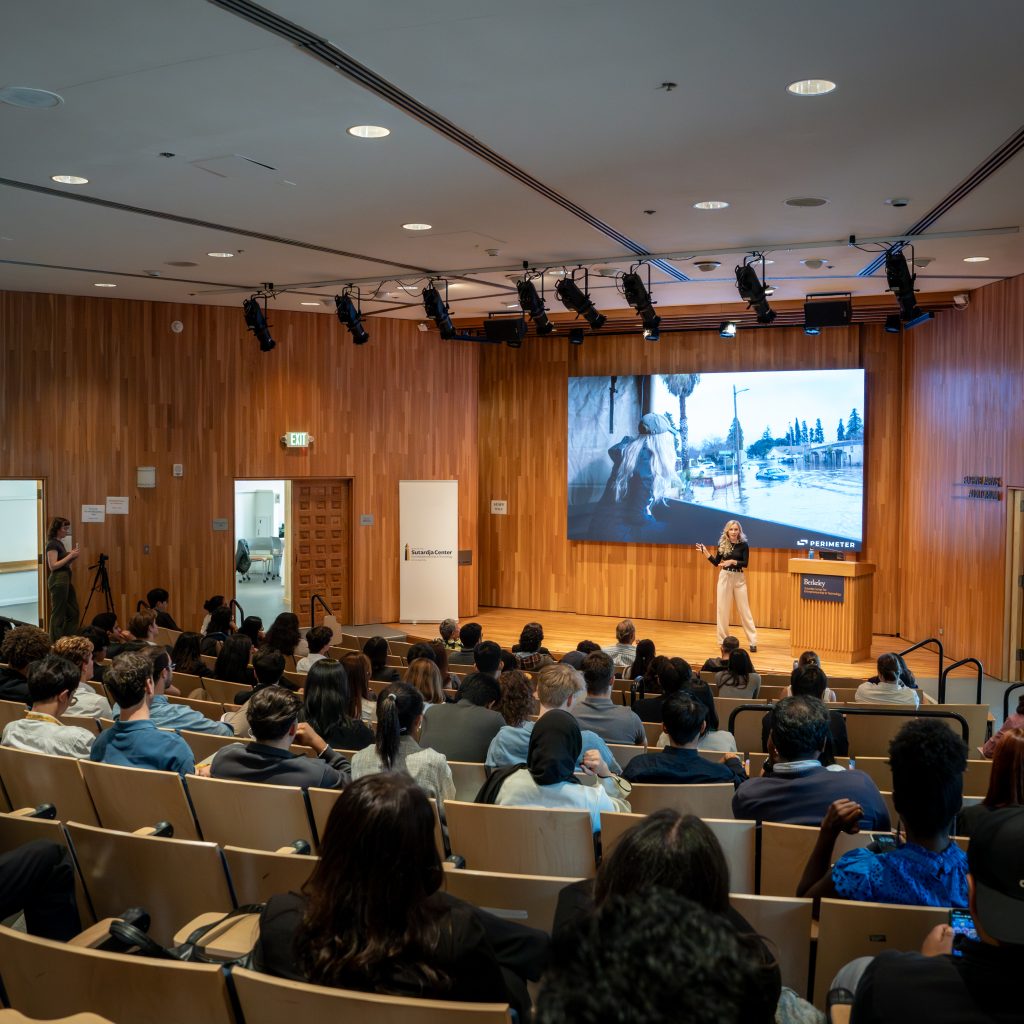
Berkeley alumni and affiliates shared their founding experiences. From struggles and how they overcame them, to iterations and multiple pivots, to the turning points and crises in scaling their businesses—their stories offered diverse case studies told from direct experience. Founders in the early stages shared vivid, in-the-trenches stories, while retired entrepreneurs turned angel investors shared reflective and systematic lessons. Hearing directly from people at different stages of their careers provided valuable, relatable lessons.
h. Games
We also played entrepreneurship-related games. One memorable exercise was a barter challenge outside the classroom: teams started with items like a pen and, within two hours, some managed to trade all the way up to a luxury watch or even a piano.
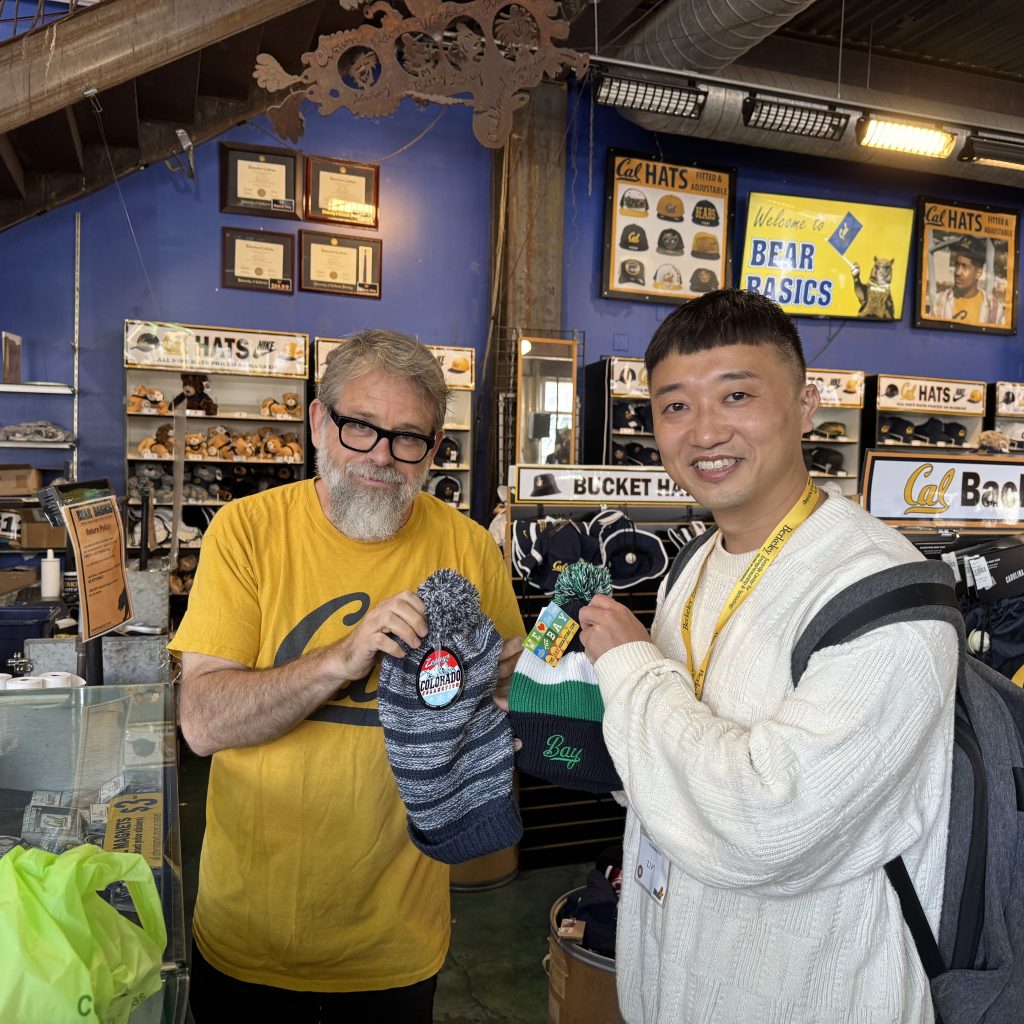
2. Team Activities (Idea Pitch to Final Presentation)
On the first day, those who wanted to pitched their ideas. I also pitched mine, then spent two hours holding up a poster to recruit team members. Some stopped to listen, but no one joined, so in the end I joined another team.
Our team of four included two students from the UK (originally from Pakistan and Ukraine), one from Honduras, and myself from Japan—a truly international mix.
The team leader, from Pakistan, wanted to tackle the challenges of migrant workers’ remittances.
His idea was already well researched—he had conducted user interviews, studied regulations and licenses, worked on system requirements, and even created a UI and pitch deck. The leader’s idea was already well thought out, so much of our time on day 2 was spent understanding what was in his head, rather than building it up from scratch.
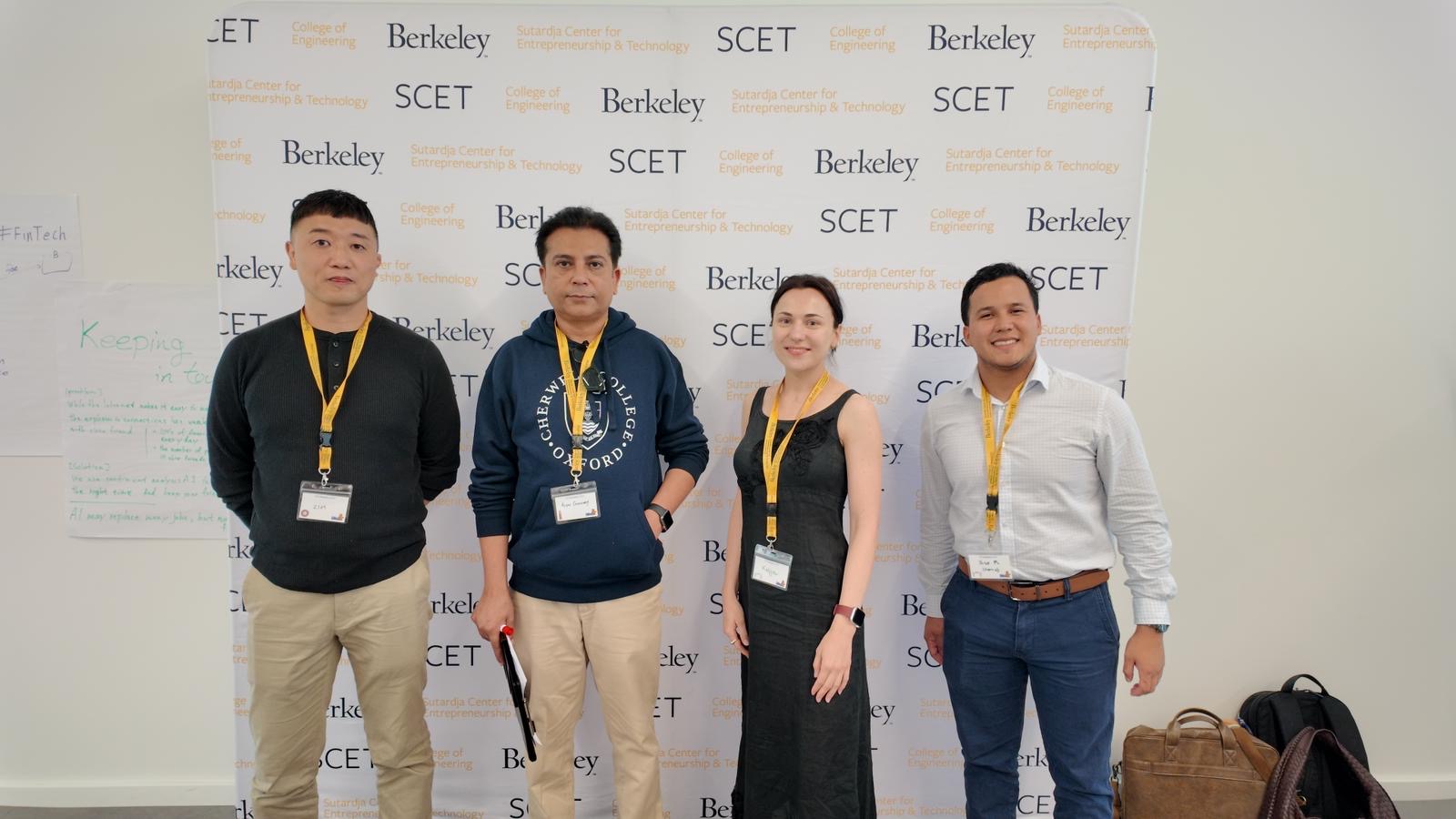
Elevator Pitch
On the third day, the leader created a document answering our questions, which greatly advanced my understanding. In short, my grasp was as follows:
- Many migrant workers actually hesitate to send money home because their local currencies are unstable and their families often cannot save effectively.
The concept was compelling but complex, and hard to explain effectively within the short time of an elevator pitch. Since even team members struggled to fully grasp it, making investors quickly understand and engage required significant effort.
Presentations
We worked late into the night with mentors, refining our story and rehearsing. Feedback included:
- Tailor the presentation to the audience. For example, U.S. investors might better relate to cases involving Mexican or Caribbean workers rather than Pakistani workers in the UK.
- Add visuals like infographics.
- Present with more emotion and personal storytelling.
Naturally, tailoring delivery to the audience is critical, but pitching to over 100 investors requires research and skill. Delivering emotionally persuasive communication in a non-native language is a high hurdle, but I realized it’s something I must work on.
Final Day
Our team didn’t win, but watching the other teams’ presentations was eye-opening. From dating apps to healthcare data services to anti-jamming military drones, the variety and quality were remarkable. Many already had traction, partnerships, or delivered emotional, passionate storytelling.
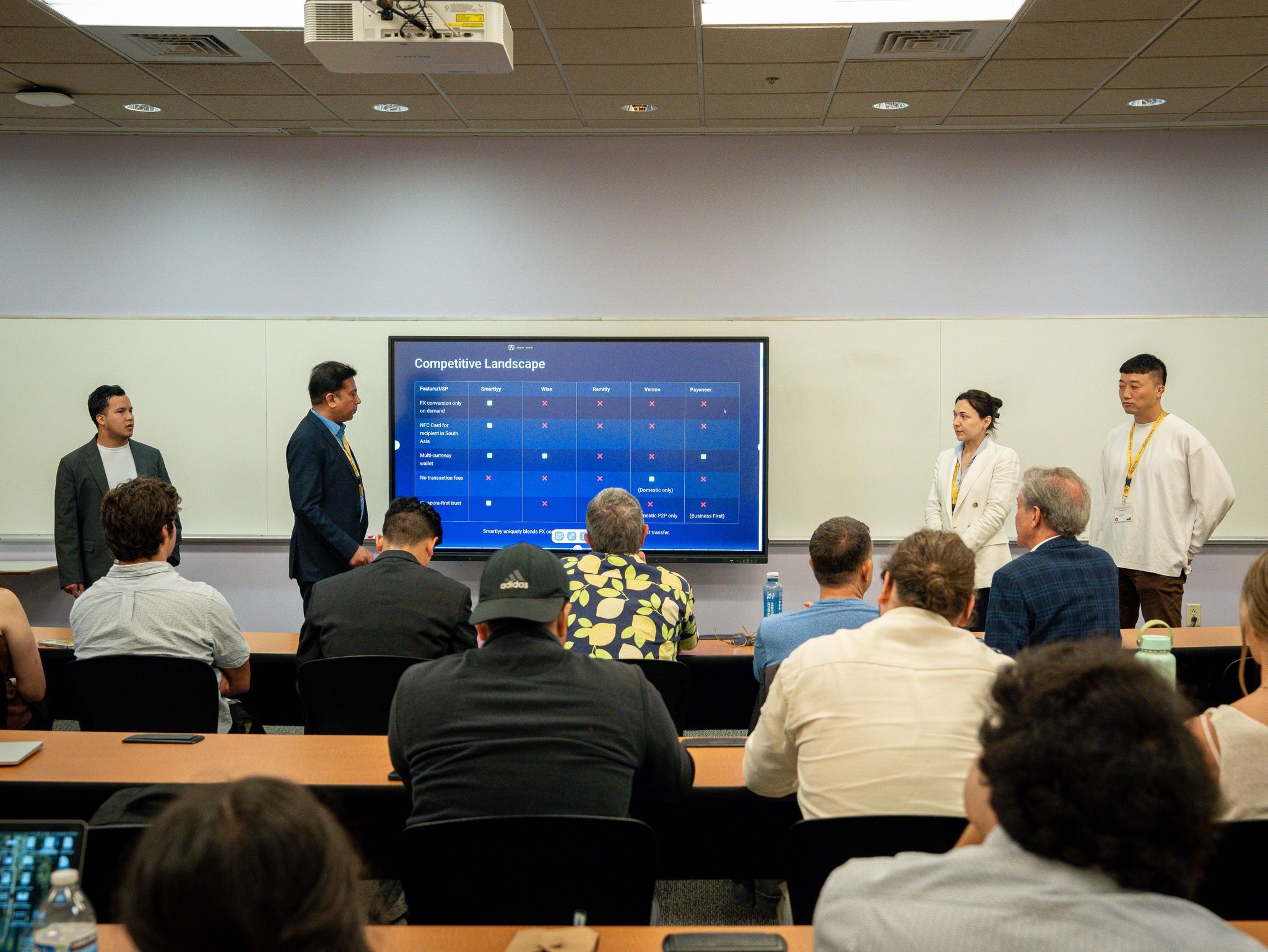
3. Cultural Reflections
Coming from Japan, I was struck by how actively students asked questions during lectures. Leadership and social interaction are deeply ingrained here as skills to be developed.
Even I found myself naturally socializing more, drawn in by the environment.
The Bay Area’s diversity was also striking. With so many immigrants and non-native speakers, there is a culture of acceptance that fuels innovation. I believe this is built on personal independence and competitiveness: the ability to clearly communicate your ideas, negotiate to make them real, and take responsibility for outcomes.
In Japan, by contrast, harmony is often overvalued, leading to risk avoidance and both startup numbers and funding amounts that fail to increase. While it’s commonly said that Japan needs ‘failure-tolerant organizations and cultures’ to foster more startups, I believe the real need isn’t ‘tolerance’ but cultivating a growth mindset. ‘Failure’ is simply one trial in the iteration process—another wave to navigate and master. A growth mindset cannot flourish when people rely on permission from unseen forces (institutions) to feel secure about failing.
These values—diversity, social skills, leadership, and personal responsibility—appear to combine with institutions like UC Berkeley and Stanford to contribute to making the Bay Area, from San Francisco to Silicon Valley, a global hub for startups.
4. Personal Reflections
This Boot Camp was my first academic experience in an English-speaking country. Pitching on the first day, conversing with many students, and gaining insights were all wonderful experiences.
At the same time, I also have points of reflection:
Challenges
- I could not fully understand lectures in real time, nor could I ask questions.
- I deepened my understanding afterward by listening to recordings, but this took much time.
- I often couldn’t jump into discussions because I couldn’t express myself quickly enough in English.
- International accents were sometimes hard to catch.
- To raise funds in an English-speaking environment, I need both the language skills to build trust and the passion to push through.
Lessons Learned
- I need to refine how I explain my career and goals clearly and concisely, especially when recruiting teammates.
- I must practice delivering persuasive, emotionally resonant presentations in English.
5. Gratitude
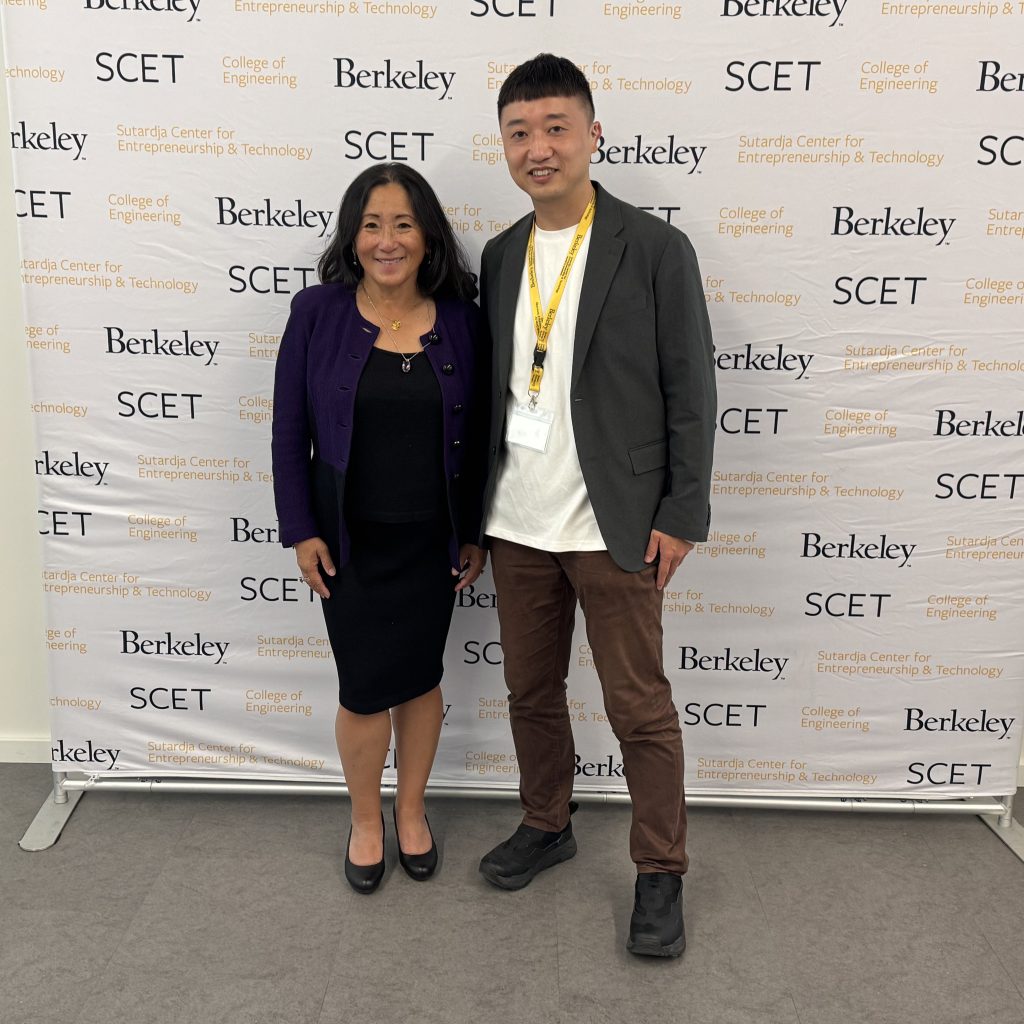
This experience was only possible thanks to Gigi Wang, who kindly accepted my request to join and encouraged my participation throughout the program.
I am also deeply grateful to my teammates—Alyas, Katya, and Jose—who supported me in many ways. Without them, my experience would have been very different.
Finally, thank you to the TAs who organized everything so smoothly, and to the participants whose energy and openness made the Boot Camp such an inspiring environment.
Thank you all.
